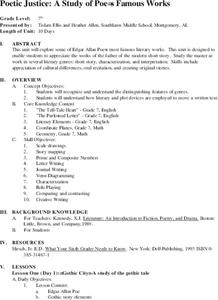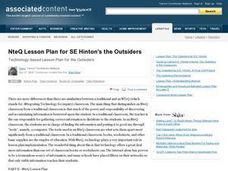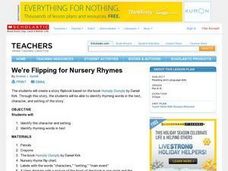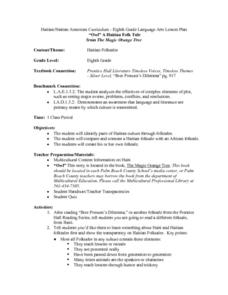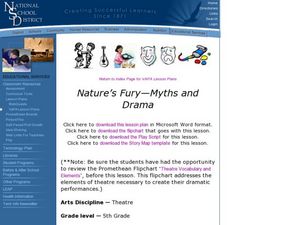Curated OER
Parts of the Plot: Constructing a Plot Diagram
Sixth graders conduct a plot diagram for a short story. They identify the problem, the rising action, the climax, the falling action, and the resolution. Students are able to sequence events in a story, and identify the parts of the plot...
All-in-One High School
Elements of Plot
Cinderella wants to go to the ball and marry the prince. At the end of the story, she does! But how does the plot move from the exposition to the resolution? Teach language arts learners and fairy tale fans about the basics of plot...
Curated OER
Different Strokes For Different Folktales
Young readers use graphic organizers, such as Venn diagrams and story maps, to analyze a variety of folktales and the elements of a story. They use writing, sequencing activities, and creative art to identify the morals learned from a...
Curated OER
Fractured Fairy Tales
Through reading and writing, learners explore common elements found in fairy tales. After discussing traditional fairy tales, class members listen to The True Story of the 3 Little Pigs by John Scieszka, a hilarious retelling of the...
Curated OER
Comparing Two Poe Classics
Students read and discuss The Black Cat and The Tell-Tale Heart. In this poetry lesson, students construct a Venn diagram to compare and contrast two pieces of literature.
Curated OER
Is there a map in that story?
Eighth graders examine different pieces of literature from specific isolated Pacific islands. In this Geography lesson, 8th graders read and interpret a written selection. Students construct a map of the stories setting.
Curated OER
What do Stories Share?
Students examine the philanthropic themes of two books. In this moral values and writing lesson, students complete a Venn diagram comparing the books Leo, the Late Bloomer and Thank You, Mr. Falker. The students discuss related themes...
Curated OER
Picturing a Story
Students view slides from the movie "Hoot" and discuss characters, setting and the caption. They identify where in the rise and fall of the plot this scene takes place. They brainstorm elements needed to create a story from a picture....
Mary Pope Osborne, Classroom Adventures Program
The Backpack Travel Journals
Strap on those backpacks, it's time to travel through history with this literature unit based on the first four books of The Magic Tree House series. While reading through these fun stories, children create story maps, record...
Curated OER
Poetic Justice: A Study of Poe's Famous Works
Students explore Edgar Allan Poe's most famous short stories. In this Edgar Allan Poe lesson, students complete a 25 page packet of activities where they recognize the features of genres and literary devices Poe uses. Students read "The...
Curated OER
The Clay Marble
Students probe the story, "The Clay Marble" by Minfong Ho to identify examples of courage, quick thinking, and perseverance. The lesson creatively extends the plot of the story by celebrating the heroin's birthday many years after the...
Curated OER
Summarizing with James and the Giant Peach
Elementary readers in literature groups practice summarizing chapter-by-chapter with Roald Dahl's James and the Giant Peach. Focus on main idea, supporting details, and the 5 Ws. Unfortunately, a clever "peach" graphic organizer to which...
Curated OER
The Librarian from Conneaut School
Second graders identify the elements of the story "The Librarian from the Black Lagoon." They listen to the story and list the story elements of character, settling, problem, and solution. They then use KidPix to create individual...
Curated OER
NteQ Lesson Plan for S.E. Hinton's The Outsiders
Explore literature through the completion of reading comprehension worksheets in class. After reading the classic book, The Outsiders by S.E. Hinton, middle schoolers review each chapter by completing study questions and story webs....
Curated OER
The Magic in Writing
Pupils watch a portion of a familiar film and write responses to a series of questions. They apply their observations to short stories.
Curated OER
The Four Seasons with "Charlotte's Web"
Students explore the characters and plot of the story, "Charlotte's Web" through the twenty-two lessons of this unit. Characters, facts, and details of the story are recalled and discussed and form the basis of several activities in this...
Curated OER
The Lord of the Flies by William Golding
Tenth graders read and analyze the novel Lord of the Flies by William Golding. They examine the setting, plot, and climax in the novel. Character descriptions, good, evil symbolic images within characters are dissected in detail with...
Curated OER
We're Flipping for Nursery Rhymes
Students read a variety of nursery rhymes with a focus on "Humpty Dumpty". While reading, they identify the words that rhyme along with the setting, plot and characters. To end the lesson plan, they complete a Venn Diagram comparing...
Curated OER
"Owl" A Haitian Folk Tale
Eighth graders read and discuss the Haitian folktale, "Owl." They compare it to the story, "Brer Possum's Dilemma," using a Venn diagram to show how they are different and alike. In groups, they retell the story in a skit format.
Curated OER
Main Ideas Of Artists
Students explore the main idea and stories behind paintings. In this art lesson plan, students discuss how paintings tell stories and take tests based on details of paintings. The tests are embedded in the plan. Links that students...
Curated OER
Most Wanted Villians
Students review the characteristics of various characters in fairytales. As a class, they review the story details and create a concept map using a software program. They create their own wanted poster of the villians in the fairytale to...
Curated OER
Beowulf: Songs of Ancient Heroes
Introduce your class to epic heroes with these activities for Beowulf. After watching a video clip, taking notes on heroes, and tracking characteristics of heroism throughout Beowulf, class members retell an episode of Beowulf using a...
Curated OER
Nature’s Fury—Myths and Drama
Fifth graders explore the elements of theatre. For this dramatic performances lesson, 5th graders discuss the structural elements of theatre and dramatize "The Origins of the Season," an explanation myth.









